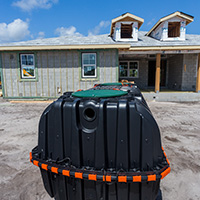 New septic-tank law challenging for governments
New septic-tank law challenging for governments
STORY BY LISA ZAHNER (Week of October 5, 2023)
A new Florida law designed to eliminate septic tanks in all-but-rural areas, and to force homeowners to hook up to sanitary sewer or install expensive on-site treatment upgrades, is posing a challenge for local governments, including the Town of Indian River Shores.
The law, introduced as Florida House Bill 1379, “prohibits new onsite sewage treatment and disposal systems (unless previously permitted) within the Indian River Lagoon Protection Program area beginning January 1, 2024, where a central sewerage system is available.
“For new developments where sewer is not available, only enhanced nutrient-reducing onsite sewage treatment and disposal systems will be authorized,” the law says.
The new regulation “requires any commercial or residential property with an existing onsite sewage treatment and disposal system located within the Indian River Lagoon Protection Program area to connect to central sewer or upgrade to an enhanced nutrient-reducing onsite sewage treatment and disposal system or other wastewater treatment system that achieves at least 65 percent nitrogen reduction by July 1, 2030.”
Parcels larger than one acre with only one residential unit can stay on a septic system, but that loophole does not help island residents.
Shores Town Manager Jim Harpring said his initial assessment of the town, based upon a map provided by Vero Beach Utilities, shows 145 residential properties out of the town’s 1,978 homes (7.3 percent of the town) still relying on septic tanks to treat raw sewage on-site.
The northernmost septic systems in the town are a pocket of homes on Legend Trail in the Indian Trails community.
The next section of septic-tanked residences includes a long stretch of 40 John’s Island oceanfront homes and seven vacant homesites on Ocean Road running south from Turtle Trail beach access.
Other streets where residents are still on septic tanks are Holoma Drive, Sunrise Terrace, Beachcomber Lane near Town Hall, and then at the southern edge of the town, Reef Lane, Pebble Lane and Surf Lane on the oceanside, plus Indian Lane and Seminole Lane on the lagoon side of A1A.
There is no plan yet to convert those septic users to sewer customers prior to the 2030 deadline. The town is still in the midst of determining who its water-sewer utility provider will be after Oct. 1, 2027, when its utility franchise agreement with Vero Beach expires. The Shores and Vero have been at odds in court for three years over a breach of contract dispute involving rates charged by Vero.
Any new construction, Harpring said, is covered by town ordinance, “Section 161.10 of our ordinances requires all new development to be served by public water and sanitary sewer lines,” Harpring said.
The City of Vero Beach has been converting septic systems on the barrier island’s most environmentally sensitive neighborhoods into hybrid sewer customers for nearly a decade using Septic Tank Effluent Pump or STEP systems, which divert all the liquid waste or effluent from the tank into the sanitary sewer system, while leaving the solid waste material to biodegrade in the septic tank.
Of the city’s 1,521 homes eligible to connect to sewer with a STEP system, 646 have already been converted and hooked up to sewer service, and 875 are still using a septic system. In the city limits, septic tanks must be inspected periodically, when a tank fails, the resident must install a STEP system. Residents can also convert voluntarily, and the city helps out with financing, because it can cost between $11,000 and $14,000 to convert using a STEP system. That cost is a combination of equipment, installation feed and sewer impact fees.
Indian River County Utilities also must figure out how to comply with the new law, but no action was taken at the joint County Commission-Sebastian City Council meeting called last month to discuss local impacts of the new law, which “requires local governments to update their comprehensive plans to include the sanitary sewer planning element by July 1, 2024.”
In the City of Sebastian alone, the county estimates between 11,000 and 12,000 single-family residences still rely on septic tanks. Connecting all of those homes to the county sewer system by the 2030 deadline would add about 3 million gallons per day to the demand on the county sewer treatment infrastructure. That does not account for additional growth in the system from new construction.
County spokesperson Kathy Copeland said the joint County Commission-Sebastian group planned to meet regularly on the topic. “They agreed that two meetings a year sounded appropriate with the option to call a special meeting between the two if an issue warranted immediate coordination.”
It’s unclear whether the burdens of this new legislation will hamper the Town of Indian River Shores’ ability to negotiate with Indian River County Utilities to take over serving the town with water-sewer utilities in 2027 when the town’s franchise with Vero expires. The county would need to have built sufficient capacity and have permits in place to serve both the Shores and all the customers converting from septic systems.




